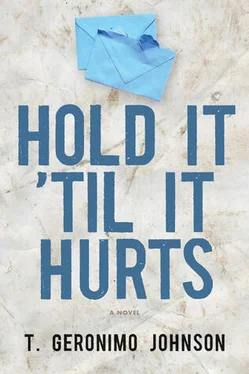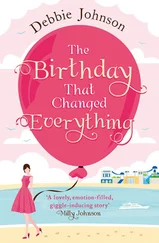He carried his mother’s flyer in his pocket, obsessed with Wages’s ritual theory, with his certainty that until you let the shit go, it ate your life. Wages was on his mind because Ines had stayed up late enough to write down his numbers: 37, 40, 112, 76, 32. That’s a hell of a combination, she had joked. But it was no mystery. It was the list from Wages’s combat report. He was counting in his sleep, confirming Wages’s numbers.
Morgue Ops personnel were like spies. Prohibited from discussing work, they even removed their badges upon leaving the facilities, the logic being that the general public should never identify them as morgue workers. Alone, flashing his military ID, Achilles was one of their tribe. Faced with someone who didn’t eye them like lepers, they gladly explained the process to him. The body, or what’s left of it, is moved through stations. A forensic pathologist looks for deformities, scars, tattoos, unique dental features like crooked teeth. They are fingerprinted, x-rayed, dental x-rayed, and DNA samples are taken. Then an autopsy, then they are embalmed and shipped if already identified. If not, they are warehoused for people like Achilles and Ines to identify. When only bones remained, they are shipped to the forensic anthropologist. A DNA test is usually reliable, but if the body’s been underwater too long, bacteria start breaking down the proteins, making them harder to identify. A full body x-ray is helpful because it reveals shrapnel, broken bones, pacemakers, and the like. When you have only limbs, it’s tough.
“The reality,” said Sergeant William Bose, “is that most of these parts won’t be identified.” Bose had just returned from a tour in Iraq. He had been off only a month when they assigned him to the mobile morgue. He was a bear of a man with a friendly smile, and when Achilles told him what he was doing, and that he was military, Bose led him to the back room so he could take a look at a few of the recently delivered corpses. Achilles was astounded at the number of loose limbs. Apparently drowning hadn’t accounted for a majority of the deaths. People had died when weakened buildings collapsed on them, from falls, and many of exposure.
“No one to sue,” said Bose.
That was true. The death toll on the Gulf Coast since Katrina was higher than the U.S. casualty rate during the first two years in Afghanistan.
“What’s the difference between killing people and letting them die, except one’s cheaper?” Bose said, looking pissed, “Man, it’s the most heartbreaking thing I’ve ever fucking seen, and I’ve seen shit. And I’m not saying this just because you’re here, but you know damn well if this were Malibu or Key West or Galveston, they would have evacuated these people in a heartbeat. It’s some dark shit when your country lets you sit out on a highway in hundred-degree weather and die just because you’re black and poor. It’s some fucked-up shit, man. It ain’t a natural disaster when a manmade object fails.” Bose was red in the face, stuttering, trying to explain the feeling of witnessing destruction on a scale usually reserved for wartime. “Sorry. I have to vent twice a day.”
Achilles understood what he meant, and wished Ines were there to hear. “No problem.” They were alone in a smaller room where bodies and limbs were held until transferred to the main room.
“So today’s your lucky day. Savor it, brother,” said Bose.
“Tomorrow it only gets worse,” they said in unison.
Achilles stopped at the sight of a gnarled hand across the palm of which ran a scar similar enough to the one he had given Troy on that birthday.
“Oh shit, man,” whispered Bose. “I’m sorry. Sit down.” He picked up his phone. “I need some paperwork back here.”
Achilles was finished within fifteen minutes. The call was the hard part. Holding the flyer in his hand, he dialed his mom using Bose’s phone, wondering if she was at her green desk, her glasses on. But she was in town, at the market buying portabello mushrooms, treating herself to her favorite meal. She liked that market because the farmers who came in from over the hill were real farmers, she said, “Straw in their teeth and cow patties on their boots.” His mother shopped at the farmer’s market less frequently now that the beltway bimbos had discovered it, driving the prices up.
He heard her occasionally offer a cheery hello to one person or another, sometimes followed by sucking her teeth. “That was Geraldine, the one who dropped that dog off in a cornfield in Shippensburg and told her kid it ran away. That was Maxine, the one who thinks she’s special because her car parks itself. She has a basket full of carrots, lettuce, and tomatoes. She shops here for salad. Isn’t that cute?” He couldn’t tell her now, alone in public, surrounded by people she despised. Yet he knew that if he didn’t tell her now, he never would. “Mom, I have bad news.”
Hearing “Mom,” she fell silent. “I knew. I felt it for a long time.”
When the call ended, Achilles was sickened by the sense of relief he felt. They had last spoken a month ago, the day before Achilles lost his cell phone pulling the wheelchair-bound man out of the water. He’d made a promise to call her at least once a week. It seemed to be enough. Over the past few months, her mood had been resigned, and somber. It was as if she was at last mourning. She had apologized. I shouldn’t have given you those papers. It was your father’s idea, and I went along with too many of his ideas when he was alive. I didn’t need to do it when he was dead. Last wishes aren’t always best wishes.
From the morgue straight to the condo. When Ines found him packing, he said, “A guy from my unit, a funeral.”
WAGES HAD WANTED HIS POSSESSIONS RETURNED TO BETHANY, especially his cross. He’d said, “If I get fucked, take it to my wife when it’s all over. I don’t want some sergeant in a lizard suit wheeling up to the door in a blue LTD, followed by a box a week later. Promise me, Conroy .”
Achilles was Connie, Troy was Conner. At times like that, they were Conroy , and Wages had spoken to them as if they were one person, as if he assumed they would both survive. Achilles had always expected that both he and Troy would make the trip to New Orleans if anything happened to Wages, but he knew it would be Troy who actually placed the cross in Bethany’s hands, Troy who comforted her, wrapping her in his long arms, resting his cheek against her hair and murmuring consolations in a voice so deep she felt it more than heard it. Later, when Achilles found himself on that white couch because it was Wages delivering Troy to him, Achilles had repaid that kindness by wondering more than once if delivering the cross would have been his ticket out of the living room. He had not wanted it, or wished it, only wondered. Still, the thought nagged him. How he wished he had stayed home. Wages, Merriweather, Wexler — how he loved them, but how he wished he had stayed home. It would have been better had he not gone at all.
He would be supervisor by now, or at least night shift manager of the ripping room, spending his nights among buzzing saws and idle chatter, the sweet smell of sawdust underfoot. He and Janice would have come back to town, with little Keelies in the backseat, and helped his mom decorate the house for Troy’s return. Otherwise they’d only come home for the holidays, like Turkey Day. It had been almost a year since he left home, and again Thanksgiving was right around the bend. He could have been driving these same roads but with Janice in the passenger seat instead of Ines, who’d insisted on accompanying him this time.
Achilles assented, suspecting he’d be dropping her off as near as Mississippi and no farther than North Carolina, the exact location depending on when he worked up the nerve to tell her the truth. He had to tell her now, she who insisted on being there for him because he had been there for her, there for Troy, there for Grandpa Paul, there for Wages’s mother.
Читать дальше












